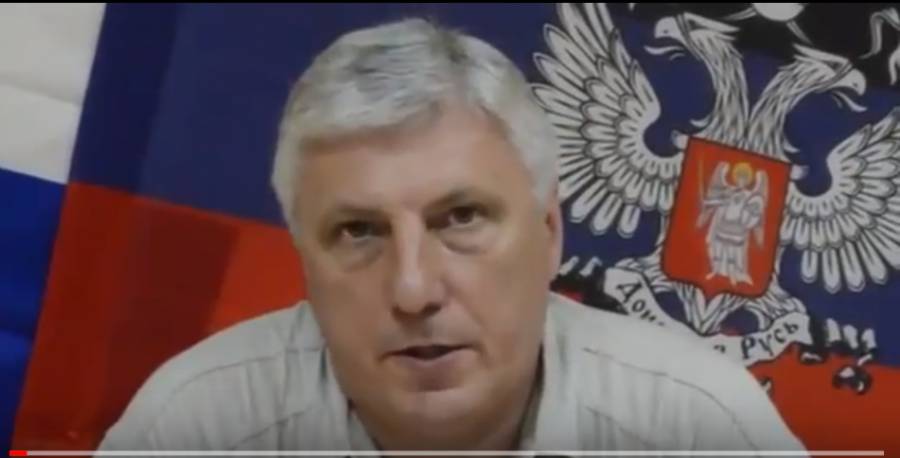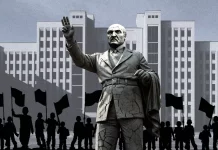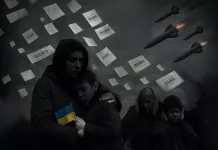
By Halya Coynash, for Human Rights in Ukraine
While media reports of Roman Manekin’s brutal murder remain unconfirmed, there seems no doubt that the prominent Russian journalist and propagandist for the so-called ‘Donetsk people’s republic’ [DPR] was taken prisoner shortly after strong criticism of at least one of the ‘DPR’ leaders. There are also reports that the reason for his disappearance may lie in his denial of the official militant line on the killing of Russian warlord Arseny Pavlov, more notorious as ‘Motorola’. The militants and Russia have treated this mercenary whom Ukraine wanted to see tried for war crimes as a ‘hero’and claimed that it was a ‘Ukrainian group of saboteurs’ who killed him.
The same report, citing a former ‘DPR minister’ Alexei Krasilnikov, now in hiding in Russia, says that Manekin wrote that he had a list of 300 Russians held prisoner by the ‘DPR’ as well as the name of the real killers of ‘Motorola’ who were certainly not ‘Ukrainian saboteurs’.
Since the claims of Ukrainian saboteurs being behind Motorola’s death (in his heavily guarded apartment block in the centre of Donetsk) have been accompanied by multiple ‘arrests’ which will almost certainly lead to yet more 15-20-year ‘sentences’, it is significant that Manekin should have bucked the official version and then been abducted / arrested.
If Russia and / or the leaders it has installed in Donbas are not implicated, why the near total silence about the disappearance of a Russian linked with the so-called ‘people’s republic’ since the Spring of 2014?
Although Manekin was born in Donbas, he is a Russian citizen who, according to Donetsk (exiled) journalist Denis Kazansky, played an active role in setting up the ‘DPR’. Kazansky notes that, although Manekin had spent most of his time in Donetsk since 2014 and “dreamed of reinstating Stalin’s times”, he appeared to still believe that he could write and say what he wanted and that he himself would be untouched by the repression.
Kazansky writes drily that Manekin miscalculated. “It’s in fascist Ukraine that you can criticize the government to your heart’s content, and nothing will happen to you. Whereas in the ‘people’s republic’ such free thinking will not lead to anything good.
On the eve of his disappearance, Manekin went for the former so-called ‘DPR foreign minister’ Alexander Kofman and wrote himself that Kofman had said that he wouldn’t kill him, but would break his bones. In fact, Manekin’s wife, who was initially seized with him, believes that the so-called ‘DPR interior minister’ Alexander Dikiy is behind her husband’s abduction. There were obviously attempts to get rid of Dikiy, which failed, however Manekin had by that stage reported his arrest.
He has not been seen since September 28, and friends are saying that he is being beaten, tortured and accused of spying for Ukraine.
This is, in fact, very much like under Joseph Stalin, when those who created the ‘revolution’ were among those whom it seized, accused of being spies, etc. and then executed.
Most of the information available is from one friend who has spoken to pro-Kremlin Russian media. Darya Mitina was in the self-styled ‘DPR foreign ministry’ in 2014, and is now secretary to the central committee of the United Communist Party.
She calls Manekin not only a journalist, but first and foremost one of the participants in what she dubs the ‘Russian Spring’ and one of the sources for the emergence of the ‘republic’.
His open criticism already cost him at least a couple of months in ‘DPR police’ detention back in 2014, with what she calls “measures of physical influence” having been applied. Then too he was accused of ‘sabotage’ though she says that he was finally released, since he was after all a Russian citizen.
His wife has since said that they were taken to a basement (where most of the Donbas militants’ hostages have been held, and often tortured, since the seizure of official buildings in early 2014). There they were questioned by “by minister Dikiy’s people”, with this first taking place in a private building and with physical force used.
Mitina says that there were “official people” (from the so-called police) who then went away leaving him with individuals who did not identify themselves and who then took him away. Mitina seems unperturbed by the fact that these unidentified individuals are then supposed to have taken Manekin to the SIZO or remand prison where a protocol was drawn up, accusing him of “sabotage against the republic, the constitutional order”.
She does, however, acknowledge that the ‘DPR’s code of procedure’ is largely on paper and not implemented, with this meaning that lawyers cannot visit a person in detention, nor the person’s relatives.
It seems that the ‘republic’ turned on its own very early on, with the former ‘minister of agriculture’ Aliya Kamar imprisoned for almost 3 years, with no investigation even pretended. Another ‘minister’ – Alexei Hranovsky – was luckier. He was held, also without access to a lawyer for around 6 months, but then at least released “without any consequences for his career”. He is now the so-called ‘minister of trade and industry’.
The main difference in Manekin’s case is simply that he is a Russian citizen, a journalist with Russian Foreign Ministry accreditation.
There is no contact at all with him, and she believes it possible that they could put something on to his computer to frame him on ‘spying charges’.
It should be noted that nothing about other ‘trials’ in the self-proclaimed ‘republics’ suggests that any fabricated evidence is even required.
For all Mitina’s acknowledgement of certain failings in the ‘republic’s’ practice, there are clearly strict limits to her criticism, and she suggests the same of Manekin, whose criticism, she asserts, was prompted by his “wish to help the development of the republic”.
Manekin remains imprisoned – or tortured and killed, if there is any substance to the reports from October 28.
By Halya Coynash, for Human Rights in Ukraine




